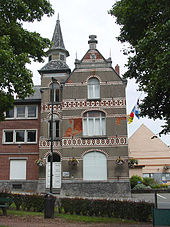Wezembeek-Oppem
Wezembeek-Oppem | |
|---|---|
 | |
| Country | |
| Community | Flemish Community |
| Region | Flemish Region |
| Province | Flemish Brabant |
| Arrondissement | Halle-Vilvoorde |
| Government | |
| • Mayor | Frédéric Petit (LB-Union) |
| • Governing party/ies | LB-Union |
| Area | |
• Total | 6.86 km2 (2.65 sq mi) |
| Population (2018-01-01)[1] | |
• Total | 14,021 |
| • Density | 2,000/km2 (5,300/sq mi) |
| Postal codes | 1970 |
| NIS code | 23103 |
| Area codes | 02 |
| Website | www.wezembeek-oppem.be |
Wezembeek-Oppem Dutch: [ˌʋeːzəmbeːk ˈɔpəm] is a municipality in the Belgian province of Flemish Brabant, 10 kilometres (6.2 mi) east of the centre of Brussels. The municipality only comprises the town of Wezembeek-Oppem proper. On January 1, 2006, Wezembeek-Oppem had a total population of 13,504. The total area is 6.82 km² which gives a population density of 1,980 inhabitants per km².
Wezembeek-Oppem is home to a large community of international expatriates, in part because of the presence of the Internationale Deutsche Schule Brüssel (iDSB) in Wezembeek-Oppem itself, and the British School of Brussels in nearby Tervuren.
Language controversies

Wezembeek-Oppem is one of the six municipalities with language facilities in the Flemish Region surrounding the Brussels-Capital Region. Wezembeek-Oppem is the only one of these that does not border Brussels directly since a narrow landstrip belonging to the municipality of Kraainem lies in between.
When the last official language census was taken in 1947, just under 30% of the population in Wezembeek-Oppem had French as their mother tongue.[2] In 1963, when the official language border was finalised in Belgium, the municipality was designed as officially Dutch-speaking, however with facilities for French-speakers. In 1993, when Belgium was turned into a federation, the municipality was included in the newly established Flemish Region.
The official language is Dutch (as everywhere in Flanders), but the facility status means citizens have the right to request official documents from the local administration in French, may get primary school education in French as well as certain other public services.
Orphanage in World War II
This section needs attention from an expert on the subject. Please add a reason or a talk parameter to this template to explain the issue with the section. (April 2009) |
During the Nazi German occupation in the Second World War, Wezembeek was the home of an orphanage set up by the fr (AJB), a Judenrat-like authority forcibly organised by the German occupational force and collaborating with the Nazis.[3] The orphanage was for Jewish children who had been orphaned because their parents were sent to death camps. From August 1944, the AJB, under hard pressure of the Comité de Défense des Juifs, decided to hide the children until the end of the occupation.
Education
This section needs expansion. You can help by adding to it. (April 2015) |
The International German School of Brussels is located in the municipality.
References
- ^ "Wettelijke Bevolking per gemeente op 1 januari 2018". Statbel. Retrieved 9 March 2019.
- ^ Frenchification of Brussels, Wikipedia, and "Histoire des discriminations linguistiques ou pour motifs linguistiques, contre les francophones de la périphérie bruxelloise (de 120.000 à 150.000 citoyens belges)". Histoire (in French). Carrefour. 2007-11-08. Retrieved 2009-01-17.
- ^ "Association of Jews in Belgium" (PDF). Shoah Resource Center. Retrieved 2009-04-09.
External links
 Media related to Wezembeek-Oppem at Wikimedia Commons
Media related to Wezembeek-Oppem at Wikimedia Commons




